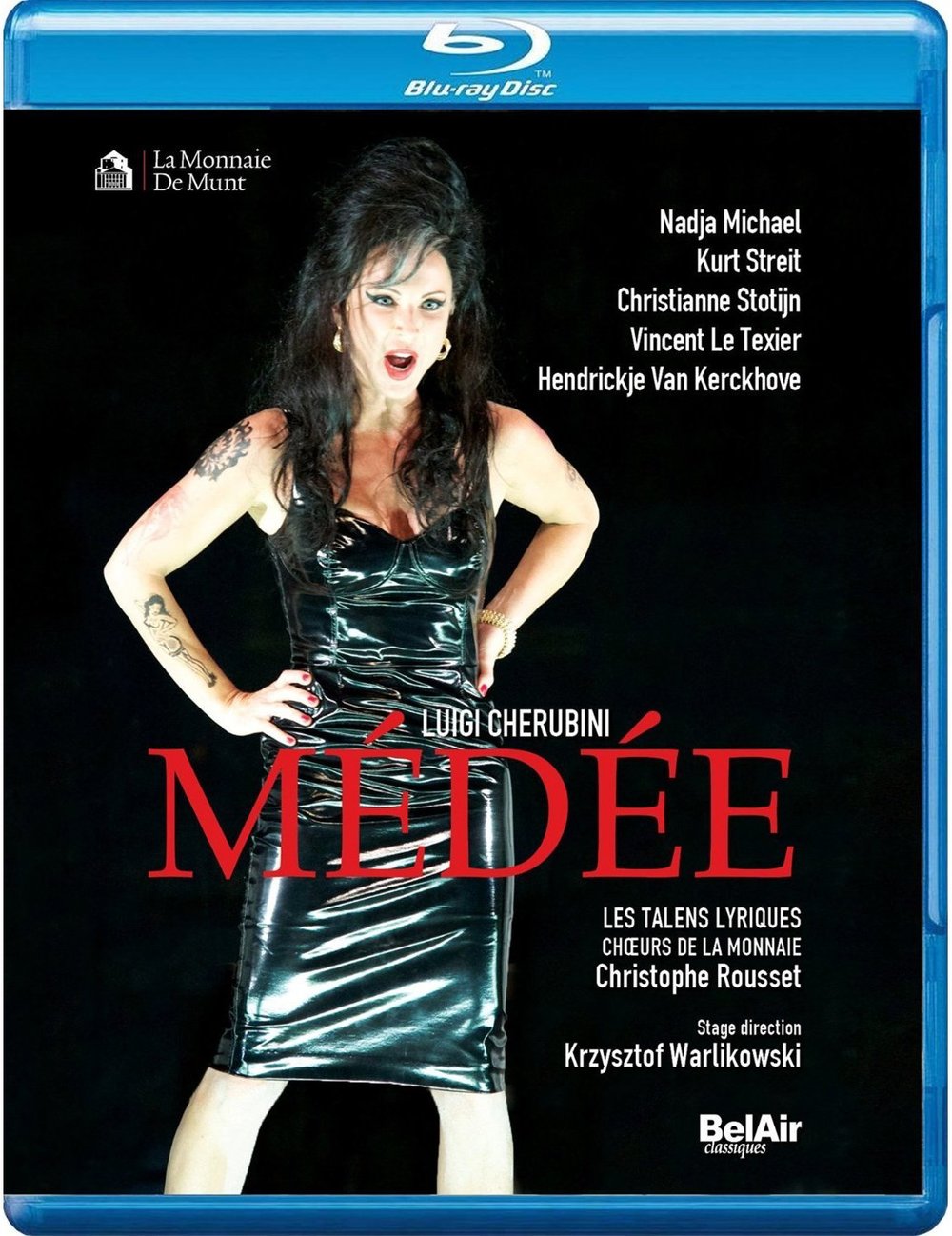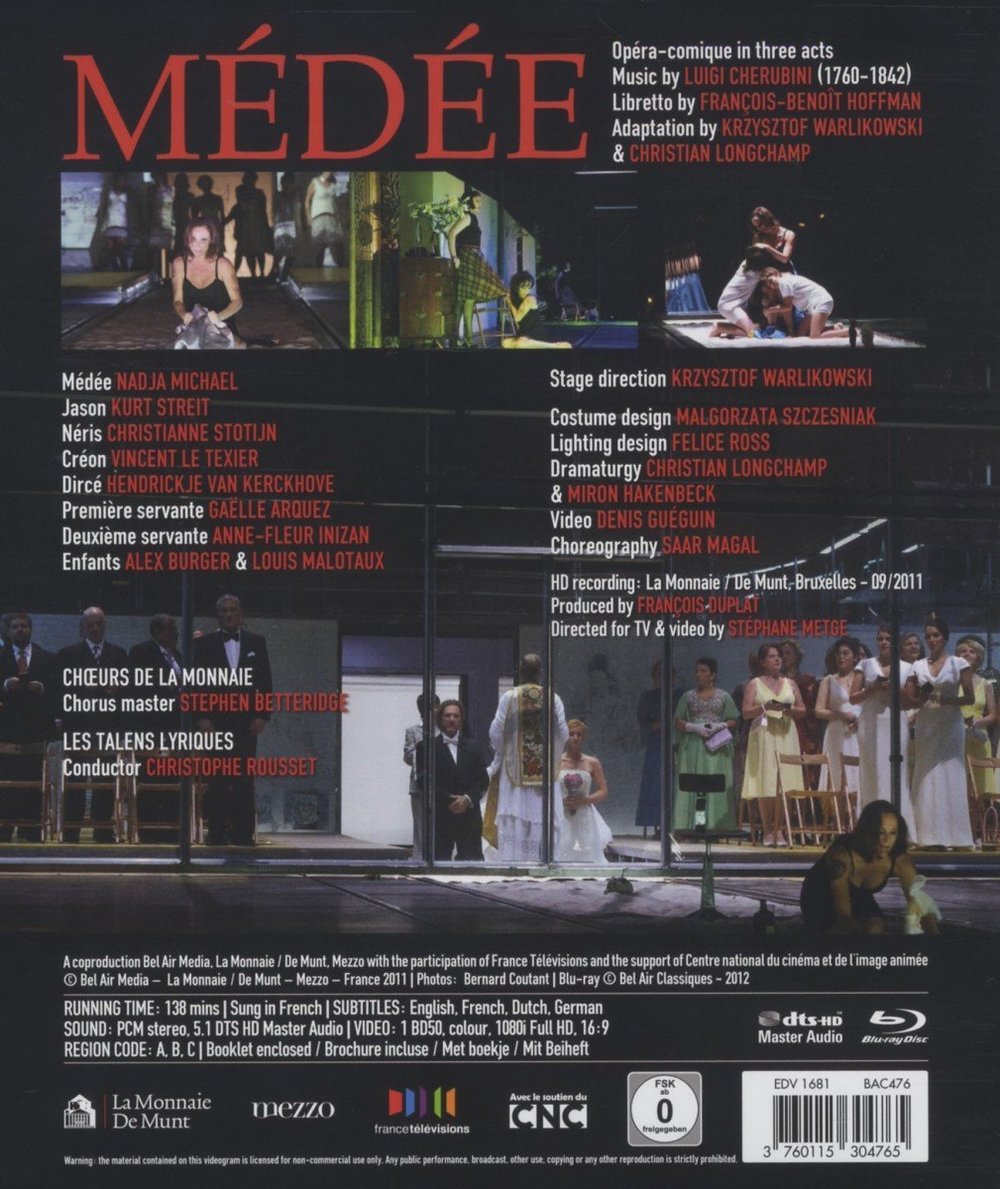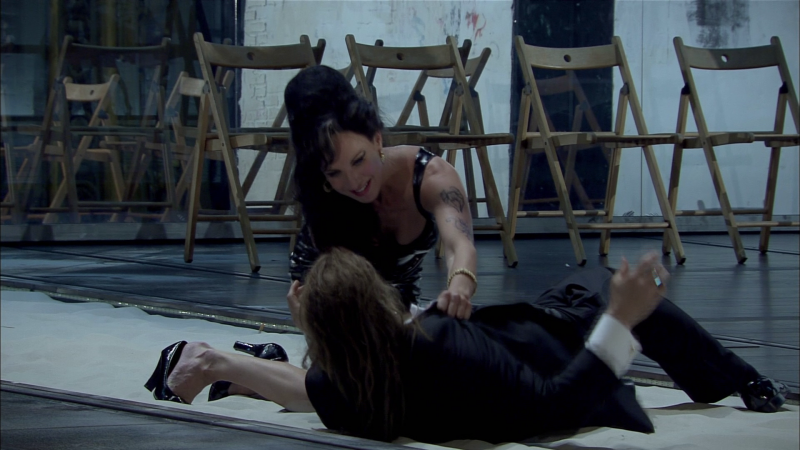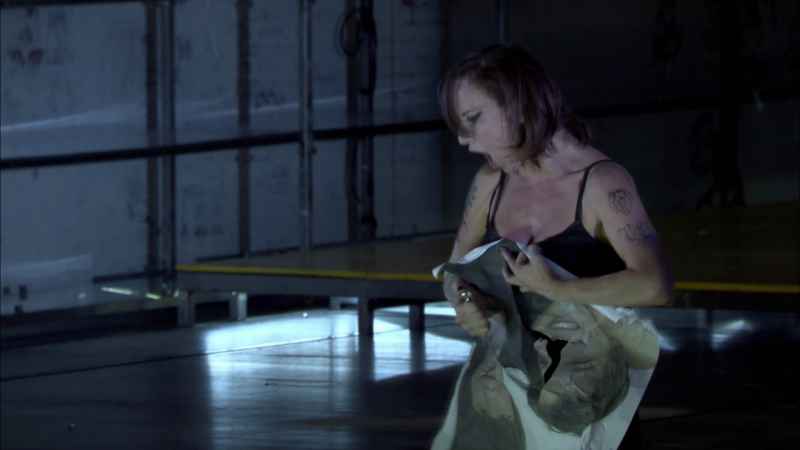

Luigi Cherubini Médée opera to a libretto by François-Benoît Hoffmann. Adaption by Krzysztof Warlikowski and Christian Longchamp. Directed by Krzysztof Warlikowski at the Théâtre Royal de la Monnaie / Koninklijke Muntschouwburg (now you know why they call it "La Monnaie" or "De Munt"). Stars Nadja Michael (Médée), Kurt Streit (Jason), Christianne Stotijn (Néris), Vincent Le Texier (Créon), Hendricje Van Kerckhove (Dircé), Gaëlle Arquez (Première servante), Anne-Fleur Inizan (Deuxième servante), Alex Burger (Enfant), and Louis Malotaux (Enfant). Christophe Rousset conducts Les Talens Lyriques and the Chœurs de la Monnaie (Chorus Master Stephen Betteridge). Costume design by Malgorzata Szczesniak; lighting design by Felice Ross, dramaturgy by Christian Longchamp and Miron Hakenback; video by Denis Guéguin; choreography by Saar Magal. Directed for TV by Stéphane Metge; produced by François Duplat. Sung in French. Released 2013, disc has 5.1 dts-HD Master Audio sound. Grade: B+
It's astonishing how many operas considered important in their times have languished and even were lost in later centuries. Brahms said (Glove Book of Opera, 2nd ed., page 403) the French version of Médée by Cherubini "is the work we musicians recognize among ourselves as the highest peak of dramatic music." But it was only sporadically performed in the 19th century and was single-handedly resuscitated by Maria Callas in the 20th century. Mike Ashman, writing in the March 2012 Gramophone (page 77-78) says subject title is the first "proper first-class recorded performance" of the work.
The orchestra score is dramatic and vivid. The eager performance by Les Talens Lyriques has that spare, clean, dry, percussive, slightly honky and out-of-tune sound so craved by period music fans. The singers were picked primarily for appearance and acting ability. But all of them sing well too as far as I can tell. John Yohalem, writing in the May 2013 Opera News (page 64) praises this disc generally—including Nadja Michael's "hysterical" dramatizing—while warning that Nadja can be "an outsider to the rules of pitch observed by the rest of the company."
You will recall that Jason went to the land of Colchis to steal the Golden Fleece. Médée, a witch and the daughter of the King of Colchis, fell in love with Jason and helped him. But later Jason abandoned Médée and sought refuge with King Creon. Jason hoped to strengthen his ties to Creon by marrying his daughter Dircé. The show opens with Dircé explaining her fears about the marriage to Jason. Will Dircé have any better luck than Médée had? Or will Jason:
Let's take a closer look at that mike. All the singers have them, but does it have to be this obvious?
Christian Longchamp modernized the spoken dialogue. The mise-en-scène is updated tacky-tyrant trash. But I don't call it Eurotrash because you can usually figure out what Warlikowski was thinking about. There's some graffiti in three languages. I think "salope" is French for the English "bitch", and "pute" is French for "whore." "Grosse" is the feminine singular adjective for "big." Médée's boys seem to be writing this, so it must be directed at poor Dircé:
Jason is trying to win Dircé over. Here Jason is hiding in the Golden Fleece (actually a blue "throw" with gold decorations) his wedding present for her. But Dircé is horrified by the manner in which the gift is presented:
There follows several impressive numbers in which Jason and King Creon manage to quiet Dircé down:
Which is turn sets the scene for the arrival of an uninvited guest. You probably can guess who this is. And yes, the subtitle spells "recognize" wrong:
Nadja Michael has a broad repertoire, but she always gets on the short list for casting the role of any psycho or sexually-perverted female killer. Michael started her career training as a swimmer in grade school in Communist East Germany. Her parents pulled her out swimming when the trainers wanted to put her on steroids. Eventually she manage to get to the West where she pursued dancing, acting, and singing. She combines an astonishing broad skill-set with the strength of a life-long, athletic health nut. And now you get to experience this in the safety of your home theater:
Back to the opera. Médée tries to get Jason back and almost succeeds. Failing this, she tries to seduce King Creon. In one scene she pulls his pants up and grasps his bare leg with both arms. Creon refuses her pleas except that he will allow her to stay for one day to say farewells to her boys. Creon doesn't know the witch has poisoned his skin, and for the rest of the opera he will be plagued by convulsive itching fits.
For the wedding scene, the director divides the stage into two views of actions taking place simultaneously:
While the wedding festivities proceed, Médée starts acting just like a Louisiana voodoo queen using dolls and photos to cast curses:
Dressed in the Golden Fleece (and wearing a golden wig), Médée marshals forces:
Médée earlier gave her own wedding dress to Dircé, which Dircé wore in the wedding ceremony. Now sensing that Dircé's is still wearing the dress, Médée orders it to catch fire.
And she kills her sons by slashing their picture:
Nadja continues to flaunt her physical prowess after the show is over. Quick, stand up, lock your knees, and touch your knees with your forehead!
About the time I finished this review, a father in Dallas, Texas was convicted of murdering his two young boys. The jury then heard the sentencing part of the trial. The father blamed everything on his wife (mother of the boys). The jury sentenced the father to death by lethal injection. Stuff like this really does happen.
OR


















